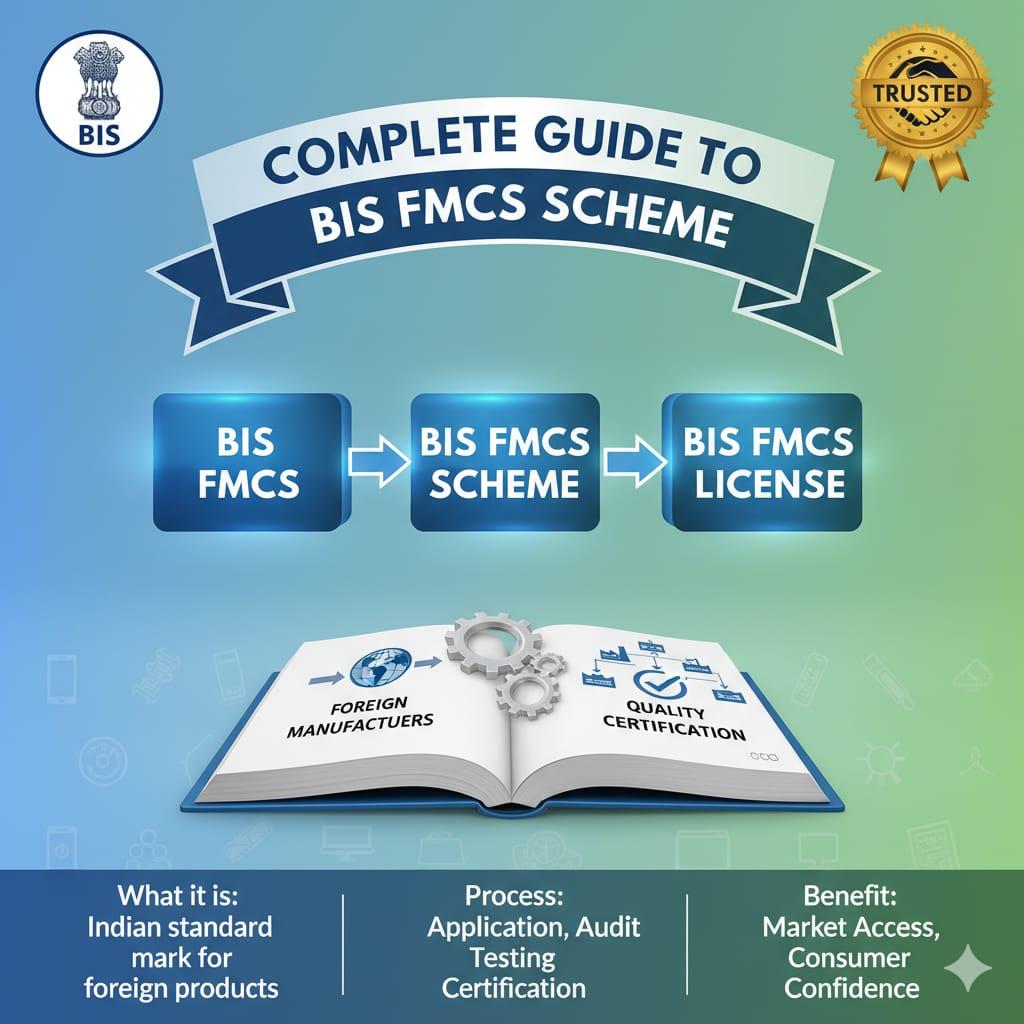Introduction
In India, the demand for safe, reliable, and high-quality products is at an all-time high. To ensure that manufacturers—especially foreign manufacturers—supply products that meet mandatory Indian Standards, the Bureau of Indian Standards (BIS) operates the BIS FMCS Scheme. This scheme grants the BIS FMCS License, which is mandatory for various product categories before they can be manufactured, imported, or sold in India. If your product falls under any Quality Control Order (QCO) or mandatory IS standard, then BIS certification under FMCS is not optional—it is a legal requirement. This comprehensive guide explains the purpose, steps, documents, eligibility, timelines, and advantages of the BIS FMCS Scheme and how companies can obtain the BIS FMCS License smoothly.
What Is the BIS FMCS Scheme?
The BIS FMCS Scheme Foreign Manufacturers Certification Scheme (FMCS) is a product certification program designed for foreign manufacturers who want to sell regulated products in India. It allows overseas factories to obtain a BIS license without the need for a physical presence in the country.
The scheme ensures that products comply with Indian Standards related to quality, safety, durability, and performance.
Under the FMCS Scheme, manufacturers can obtain certification for products such as:
-
Steel and steel products
-
Cement
-
Chemicals
-
Pressure cookers
-
Electrical cables
-
Footwear
-
Batteries
-
Household appliances
-
Industrial tools
Any foreign brand or manufacturer dealing with regulated products must first obtain the BIS FMCS License before exporting to India.
Why BIS FMCS License Is Important
The BIS FMCS License is mandatory for specific products because it:
-
Ensures conformity to Indian Standards
-
Protects consumer safety
-
Prevents substandard and unsafe imports
-
Helps Indian customers access reliable products
-
Reduces risk of customs rejection
-
Builds long-term brand reputation
Without this license, importers cannot clear customs, distributors cannot sell the product, and manufacturers may face penalties or bans.
How the BIS FMCS Scheme Works
The BIS FMCS Scheme is highly structured and involves multiple steps such as factory inspection, sampling, testing, and documentation review. Since it deals with high-risk or industrial products, BIS follows a stringent evaluation process before granting the license.
Step-by-Step Process to Obtain a BIS FMCS License
1. Identify the Relevant Indian Standard (IS)
Each product category corresponds to a particular IS standard. This determines testing requirements, labeling rules, and compliance parameters. Selecting the wrong standard leads to rejection.
2. Submit Application to BIS
The manufacturer submits the application along with technical documents, product details, quality manuals, and manufacturing process information.
3. Factory Inspection by BIS Officers
This is the most important stage. BIS officials visit the foreign factory to:
-
Inspect the production facility
-
Evaluate machinery & equipment
-
Check quality control systems
-
Review raw materials & testing infrastructure
-
Verify manufacturing competence
The factory must demonstrate that it follows all BIS-prescribed quality norms.
4. Sample Collection & Testing
During the audit, BIS officers collect product samples, which are sent to India for testing in a BIS-recognized laboratory. The test results must comply with the Indian Standard.
5. Review & Evaluation
BIS reviews the documents, factory audit report, and test results. Any mismatch must be corrected by the manufacturer.
6. Grant of BIS FMCS License
Once all requirements are successfully met, BIS issues the BIS FMCS License, allowing the manufacturer to mark the product with the Standard Mark and export it to India.
7. Annual Surveillance & Renewal
BIS conducts periodic surveillance audits to ensure continuous compliance. The license must be renewed annually.
Documents Required for BIS FMCS License
BIS FMCS License must provide a complete set of documents, including:
-
Business registration certificate
-
Factory layout & machinery details
-
Quality control plan
-
List of production equipment
-
Internal test reports
-
Raw material specifications
-
Product design & specifications
-
Manufacturing process flowchart
-
ISO certificate (if applicable)
-
Authorization letter
-
Packaging and labeling details
Incomplete or incorrect documentation can delay approval.
Timeline for BIS FMCS Certification
The typical timeline for obtaining the FMCS License is:
-
Application Preparation: 2–4 weeks
-
BIS Audit Scheduling: 4–6 weeks
-
Factory Audit & Sample Testing: 4–8 weeks
-
Final License Approval: 2–3 weeks
Overall timeline: 10–16 weeks, depending on product category, testing duration, and audit readiness.
Challenges in BIS FMCS Scheme
Foreign manufacturers often struggle with:
-
Complex documentation
-
Understanding Indian Standards
-
Meeting factory audit requirements
-
Delays in sample testing
-
Labeling and marking compliance
-
Regular communication with BIS
-
Language barriers & time zone differences
A small mistake can lead to rejection, delays, and financial loss. This is why expert support is highly recommended.
Benefits of BIS FMCS License for Manufacturers
-
Legal approval to supply products in India
-
Smooth customs clearance for importers
-
Increased brand credibility
-
Access to India’s fast-growing market
-
Assured consumer trust
-
Strong competitive advantage
-
Elimination of counterfeit imports
Conclusion
The sunconsultants.co.in plays a vital role in maintaining India’s quality ecosystem and ensuring that foreign-manufactured products meet strict safety and performance standards. Obtaining a BIS FMCS License may seem challenging, but with the right documentation, audit preparation, and compliance assistance, manufacturers can achieve certification smoothly and confidently.



